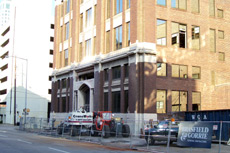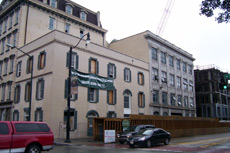Should Patrick Cooper’s lawsuit against mayor-elect Langford continue?
If there was a chance that he could win in court, I’d be all for him going ahead and seeing what happens. The funny thing is, most lawyers seem to be saying that the changes of Cooper’s contest being successful are quite slim, despite letters of support in Sunday’s Birmingham News. And even if Cooper was successful, Langford would be able to go and register for the race again seeing as how he would be able to claim residency a little easier now.
That or he would be getting written in by the more than 50% that voted for him last time, in addition to some who voted for Cooper that are becoming disenfranchised with him after this demonstration of doing just what he campaigned that he wouldn’t do.
There are many who are regular readers of this site that may disagree with me about the idea of Cooper letting it lie, but I have an interesting situation to lay before you. Let’s say that Cooper had conceded the race the morning after the election, pledging to work with the mayor-elect to move the city forward and truly lead Birmingham towards being the 21st century New South city that both men believe it can become. The two men combined carried nearly 80% of the popular vote on Election Day. Now let’s assume that Governor Riley decided to not make a special appointment to the Jefferson County Commission and that a special election was called to be held in February. Cooper could easily have taken part in the race and probably could have been seen as a contender for winning the position.
Let’s say that Cooper won – you’ve suddenly put two populist-elected officials in two extremely powerful positions in local and regional politics. If the city and region did not move forward then, people would have to answer for it. The people would have spoken not once, but twice, saying that the region must move forward and that they were willing to put their faith in people that were willing to do things outside of the box. (My biggest problem with that phrase is “why is there a box to begin with?”)
This scenario may have played out, though now it may not as many are becoming increasingly impatient with Mr. Cooper as he carries out a personal crusade against the man that promised he wouldn’t run against him for mayor. Well unfortunately for him he did, and he won. Removing Langford from the equation before Election Day would have landed him in a runoff; now it would open up a Pandora’s Box of uncertainty.
Cooper has said that he does not care about his political future, but there are many out there that do, many that decided to vote for you because of wanting a change who are not quite sure what they would have gotten.
The court of public opinion still appears to be out on both men as Birmingham prepares to buckle up for the interesting ride that is a Langford mayoral term and the promise of Patrick Cooper’s name remaining in the public eye, at least for the short term. The only fear that some of Cooper’s staunch supporters may have is his name becoming one of those in the coming months and years that when mentioned evokes comments like “he had so much potential; it’s a shame he acted the way that he did in ’07.”
André Natta is the publisher and managing editor of The Terminal. To submit letters in response to this commentary or to contact for general information, use any of the methods listed on our contact page.









A simple gesture
It wasn’t his promises for being tough on crime. It wasn’t his promise to build a dome in the city limits of Birmingham. It wasn’t his announcement that whether you agreed with him or not that “from the bottom of my heart, that I do not care” (though it was very much the attitude I’d expect from someone who is determined to move his hometown forward). It was one action that albeit simple made me understand just what it means to Mayor Langford to be the guy in charge of the state’s largest city.
Immediately after the oath of office was administered on stage at the same building he pledged to demolish to provide room for the Southeast’s largest public art museum to expand, he stepped to the mic to correct a wrong that was not done to him, but to the man he follows into office. He asked Mayor & Mrs. Kincaid to join him on stage and sit with the elected officials and invited guests that were already up there. Then he let the former caretaker of our city step to the mic.
Perhaps some would see it as simple, but it’s those simple acts that are more important to me than anything else. Whether or not I voted for him, I realized that he, like all of the others that ran for the office, care deeply for this city; enough that they were willing to be dragged through the dirt and be ridiculed by people who would smile to their faces and verbally stab them in the back later on.
One thing I prided myself on during the campaign was being as non-partisan as possible. I did not see it as my place to tell the people of Birmingham who to vote for; I’d rather let them tell themselves. That is the point of The Terminal; to get the dialogue going so that the crowd isn’t being led, but are leading. The ironic thing is that I didn’t vote for either of the “frontrunners” in the campaign (and I’ll never tell who I did vote for), though many thought that the site was leaning in one direction. It was a collective voice of those that wanted to see change occur.
I come from a place that’s long gone from most people’s minds that believes that after the battle is fought that the community should come together and do their part to move the city forward. Period. No name calling, no grandstanding, nothing but the willingness to see their community do what it needs to do. If I didn’t, I’d hate to think of what my father would say or do to me, no matter how much older or taller I am now.
For the better part of the last six months I’ve been so focused on making a certain website a success that I’ve forgotten how much fun it can be to just let things be and happen. I’ve “enjoyed” verbal assaults that may help some folks feel good about themselves when they look at themselves in the mirror but that really didn’t make any sense. In the end it’s supposed to be more important to be above the fray. That is what will help move the city and the region forward.
Whether or not you believe that he’s the man to do it, Mr. Langford carried more than 50% of the vote to avoid a runoff. Barring a decision by a judge, he will be serving the city of Birmingham for the foreseeable future. He took a huge step to proving that despite the battles that lay ahead and the rhetoric that will be spoken that he can honor those that need to be honored and do right by the city that elected him. He is probably more like a New Yorker than I thought. And that gesture involving Mayor Kincaid proved that he does care and that he can operate above the fray. It is his hometown after all.
Unless and until it changes, let’s see if we can help him do something. It is our city.
André Natta is the publisher and managing editor of The Terminal. To submit letters in response to this commentary or to contact for general information, use any of the methods listed on our contact page.
Leave a comment
Posted in Alabama, Birmingham, Commentary, Election '07, politics